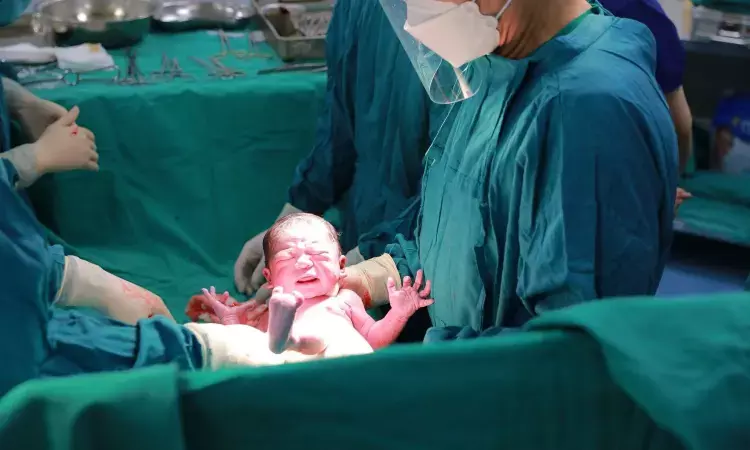- Home
- Medical news & Guidelines
- Anesthesiology
- Cardiology and CTVS
- Critical Care
- Dentistry
- Dermatology
- Diabetes and Endocrinology
- ENT
- Gastroenterology
- Medicine
- Nephrology
- Neurology
- Obstretics-Gynaecology
- Oncology
- Ophthalmology
- Orthopaedics
- Pediatrics-Neonatology
- Psychiatry
- Pulmonology
- Radiology
- Surgery
- Urology
- Laboratory Medicine
- Diet
- Nursing
- Paramedical
- Physiotherapy
- Health news
- Fact Check
- Bone Health Fact Check
- Brain Health Fact Check
- Cancer Related Fact Check
- Child Care Fact Check
- Dental and oral health fact check
- Diabetes and metabolic health fact check
- Diet and Nutrition Fact Check
- Eye and ENT Care Fact Check
- Fitness fact check
- Gut health fact check
- Heart health fact check
- Kidney health fact check
- Medical education fact check
- Men's health fact check
- Respiratory fact check
- Skin and hair care fact check
- Vaccine and Immunization fact check
- Women's health fact check
- AYUSH
- State News
- Andaman and Nicobar Islands
- Andhra Pradesh
- Arunachal Pradesh
- Assam
- Bihar
- Chandigarh
- Chattisgarh
- Dadra and Nagar Haveli
- Daman and Diu
- Delhi
- Goa
- Gujarat
- Haryana
- Himachal Pradesh
- Jammu & Kashmir
- Jharkhand
- Karnataka
- Kerala
- Ladakh
- Lakshadweep
- Madhya Pradesh
- Maharashtra
- Manipur
- Meghalaya
- Mizoram
- Nagaland
- Odisha
- Puducherry
- Punjab
- Rajasthan
- Sikkim
- Tamil Nadu
- Telangana
- Tripura
- Uttar Pradesh
- Uttrakhand
- West Bengal
- Medical Education
- Industry
Meconium-Related Obstruction in Newborns occurs mostly without cystic fibrosis or Hirschsprung disease: JAMA

Researchers have found in a new study that contrary to popular belief nearly 95% of meconium-related obstruction (MRO) cases occur without cystic fibrosis or Hirschsprung disease. Further MRO is most common in preterm infants, who tend to have longer hospital stays and a higher likelihood of requiring surgical intervention. This study was conducted by Jordan M. published in the JAMA Network Open.
This retrospective cohort analysis used data from the National Inpatient Sample from January 1, 2016, through December 31, 2020. Survey weighting techniques were used to estimate the national incidence of MRO by etiology and to determine its relationship with clinical outcomes. The analysis included 3,550,796 live births, with emphasis on those with a diagnosis of MRO. The main outcome was the diagnosis of MRO, and secondary outcomes were mortality, requirement for abdominal surgery, hospital stay, and cost of hospitalization. Multivariable regression analysis was employed to determine characteristics linked to MRO and its clinical implications.
Key Findings
1844 infants (0.1%) were treated for MRO.
41 (2.2%) of them had cystic fibrosis, 60 (3.3%) had Hirschsprung disease, and 1743 (94.5%) had neither.
Preterm infants presented with the highest risk, with:
4.7 cases of MRO per 100,000 births attributed to cystic fibrosis.
4.7 cases of MRO per 100,000 births attributed to Hirschsprung disease.
187.3 cases of MRO per 100,000 births in those without either condition.
Newborn infants born at 28 to 31 weeks and 6 days gestation had the greatest chance of developing MRO, with an adjusted odds ratio (AOR) of 6.08 (95% CI, 4.27-8.67) as compared to full-term newborn infants.
Among preterm newborn infants, having an MRO was correlated with:
An increase in the demand for abdominal surgery by 4.2 percentage points (95% CI, 3.1-5.4).
An additional hospital stay of 7.3 days (95% CI, 5.8-8.8 days).
An additional cost of hospitalization of $23,215 (95% CI, $17,739-$28,690).
No change in the rate of mortality (0.1 percentage point change [95% CI, -0.6 to 0.8]).
This study of more than 3.5 million infants concluded that MRO was highest in preterm infants without cystic fibrosis or Hirschsprung disease. These findings highlight the importance of better management strategies. Future studies must aim at establishing early diagnostic modalities and focused treatments to reduce the burden of MRO in susceptible neonates.
Reference:
Rook JM, Chervu N, Calkins KL, Benharash P, DeUgarte DA. Meconium-Related Obstruction and Clinical Outcomes in Term and Preterm Infants. JAMA Netw Open. 2025;8(2):e2459557. doi:10.1001/jamanetworkopen.2024.59557
Dr Riya Dave has completed dentistry from Gujarat University in 2022. She is a dentist and accomplished medical and scientific writer known for her commitment to bridging the gap between clinical expertise and accessible healthcare information. She has been actively involved in writing blogs related to health and wellness.
Dr Kamal Kant Kohli-MBBS, DTCD- a chest specialist with more than 30 years of practice and a flair for writing clinical articles, Dr Kamal Kant Kohli joined Medical Dialogues as a Chief Editor of Medical News. Besides writing articles, as an editor, he proofreads and verifies all the medical content published on Medical Dialogues including those coming from journals, studies,medical conferences,guidelines etc. Email: drkohli@medicaldialogues.in. Contact no. 011-43720751


